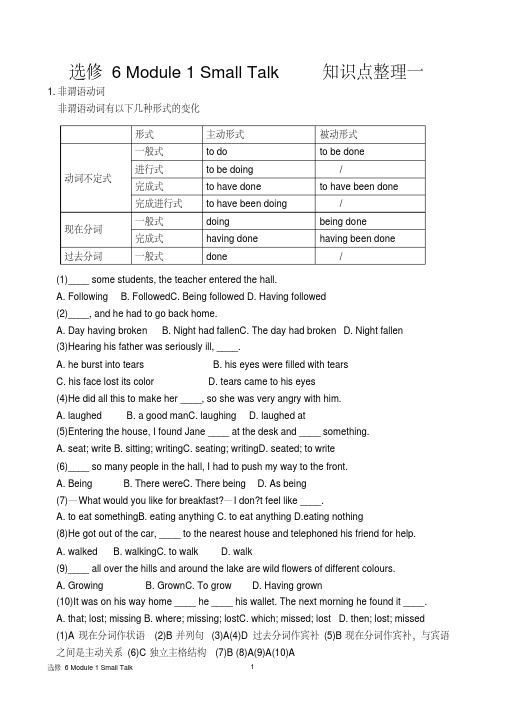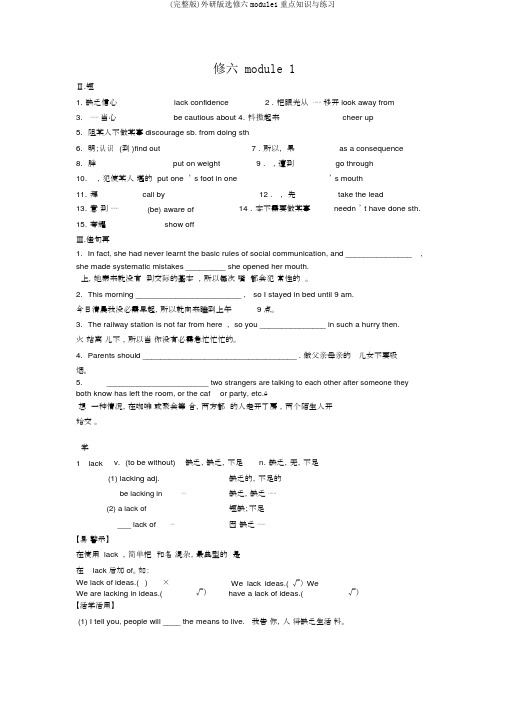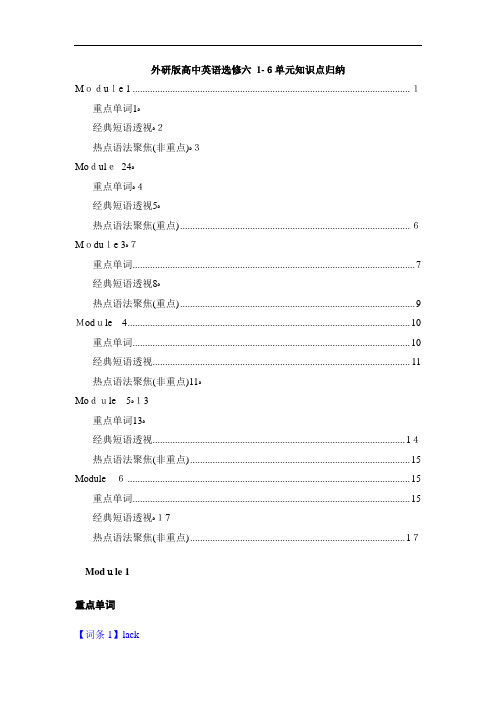(完整版)精编外研版选修六module1重点知识与练习
外研版高中英语选修六 1-6单元知识点归纳

外研版高中英语选修六1-6单元知识点归纳-CAL-FENGHAI.-(YICAI)-Company One1外研版高中英语选修六 1-6单元知识点归纳Module 1【词条1】lack【点拨】lack动词, 意为"缺乏,没有"。
如:He is good at his job but he seems to lack confidence.What he lacks in experience he makes up for in enthusiasm.【拓展】1. lack的常用短语有:be lacking"欠缺,缺乏";be lacking in"缺乏(某种品质、特点等)";lack (for) nothing"应有尽有"。
如:Money for the project is still lacking.I think the film is lacking in pace.They have got everything ready and they lack for nothing.2. lack还可作名词,常与of连用,意为"缺乏,没有"。
for lack of "因为缺乏……"。
如:The work had to be stopped for lack of funds.The flowers withered for lack of water.【词条2】reply【点拨】名词,意为"回答,答复",常与介词to 连用。
如:Is it a reply to the first or the second letter?To my anger, she made no reply to my question.其常用在短语in reply to中,意为"作为对……的回答,回复"。
外研版顺序选修6模块1语言点及语法点整理

Book 6 Module 1要点一单词v.缺乏;缺少(作不及物动词时常接for或in)n.没有,不足,缺乏归纳拓展(1)lack(for)sth.缺少……(不用于被动语态,多用于否定句中)lack common sense/courage缺乏常识/勇气lack for nothing应有尽有(2)be lacking in缺少(品质、特点等),……不足(3)for/through/due to/because of (a) lack of因缺少……no lack of不缺少;足够例句:She seems to be lacking in common sense.她似乎缺乏常识。
Lack of heat made us cold when we were staying in that small hotel.住在那家小旅馆时,没有暖气让我们觉得很冷。
The project was in vain for lack of money.工程因缺乏资金而作废。
同类辨析(1)lack是普通用词,指完全没有或部分缺少,既可指具体事物,也可指抽象概念,如智力、知识、勇气等。
(2)shortage指“短缺”,是就需要量而言。
例句:Our main difficulty in the quake-hit area is a shortage of food and medicine.我们受灾地区的主要困难是缺乏食物和药品。
【链接训练】①The explorer got a disease in blood for the ________ of fresh vegetables and fruit.【解析】for the lack of“因缺少……”,为固定搭配。
【答案】B②I don’t think he is the suitable person for he ________ experience, _________ is essential for the job.A. lacks;whichB. lacking;asC. lacks of;whichD. lacked;that【解析】空一考查lack用作及物动词,意为“缺少,缺乏”,后面直接跟宾语;空二考查which引导的非限制性定语从句。
最新(外研版)选修6Module1SmallTalk知识点整理一整理

选修6 Module 1 Small Talk知识点整理一1.非谓语动词非谓语动词有以下几种形式的变化(1)____ some students, the teacher entered the hall. A. FollowingB. FollowedC. Being followedD. Having followed(2)____, and he had to go back home. A. Day having brokenB. Night had fallenC. The day had brokenD. Night fallen(3)Hearing his father was seriously ill, ____. A. he burst into tears B. his eyes were filled with tears C. his face lost its color D. tears came to his eyes(4)He did all this to make her ____, so she was very angry with him.A. laughedB. a good manC. laughingD. laughed at(5)Entering the house, I found Jane ____ at the desk and ____ something. A. seat; write B. sitting; writingC. seating; writingD. seated; to write (6)____ so many people in the hall, I had to push my way to the front. A. BeingB. There wereC. There beingD. As being(7)—What would you like for breakfast?—I don?t feel like ____.A. to eat somethingB. eating anythingC. to eat anythingD.eating nothing(8)He got out of the car, ____ to the nearest house and telephoned his friend for help. A. walked B. walkingC. to walkD. walk(9)____ all over the hills and around the lake are wild flowers of different colours.A. GrowingB. GrownC. To growD. Having grown(10)It was on his way home ____ he ____ his wallet. The next morning he found it ____. A. that; lost; missing B. where; missing; lostC. which; missed; lost D. then; lost; missed (1)A 现在分词作状语(2)B 并列句(3)A(4)D 过去分词作宾补(5)B 现在分词作宾补,与宾语之间是主动关系(6)C 独立主格结构(7)B (8)A(9)A(10)A形式主动形式被动形式动词不定式一般式to do to be done进行式to be doing /完成式to have done to have been done完成进行式to have been doing / 现在分词一般式doing being done 完成式having done having been done过去分词一般式done/2.从句练习(1)They want to know ______ do to help us.A. what they canB. how they canC. how can theyD. what can they(2)His teacher ______ he ______ bright and ______ he was worth teaching.A.didn?t think;was;thatB.thought;was;whetherC.didn?t think;was;/D.thought;wasn?t;/(3)______ is done cannot be undone.A.HowB.ThatC.WhatD.Where(4)Take care ______ you don?t make mistakes in the coming exam.A.of thatB.about thatC.for whatD.that(5)To his surprise,the umbrella was not ______ he had put.A.whichB.whereC.the placeD.that(6)______ we can?t get seems better than ______ we have.A.What;whatB.What;thatC.That;thatD.That;what(7)______ we’ll go camping tomorrow depends on the weather.A.IfB.WhetherC.ThatD.Where(8)______ they are most interested in is ______ they can produce more and better cars.A.That;howB.What;howC.What;whatD.That;that(9)He made a suggestion that the English test ______ until next Wednesday.A.will be put offB.be put offC.will put offD.put off(10)I don?t think ______ he said something like that is right.A.thatB.whatC.whetherD.when(11)___what you?re doing today important,because you?re trading a day of your life for it.A.MakeB.To makeC.MakingD.Made(12)Grandma pointed to the hospital and said,“That?s____I was born.”A.whenB.howC.whyD.where(13)Native Americans from the southeastern part of____is now the United States believed that the universe in which they lived was made up of three worlds.A.thatB.whichC.whereD.what(1)A析:此题要选陈述语序项,故应排除C、D。
选修6 Module 1外研社高中英语单元知识点

【仿句自测】根据下面句式仿写句子 ①祈使句+and/or+陈述句(常用将来时) 仿写:穿上外套,否则你会着凉的。 Put on your coat, or you’ll catch a cold. ___________________________________ ②no matter how引导让步状语从句 仿写:不管花多长时间,我总要完成这项工作。 I’ll finish the job,no matter how long it takes. _________________________________________
Talk to a man about himself 和一个人谈论他自己), ____( and 那 1. _________________________(
么) he will speak to you for hours! 2.—Did the immigration people ask to see your visa? didn’t need to get a visa 不必持签证). —I _____________________( It’s a long time since 自从„„以来很长时间了) I heard 3. ___________________( from you. Every time 每次) I open my mouth, I put my foot in it. 4. ___________(
拉塞尔的父母确保他什么都不缺。
【点津】(1)lack既可以作动词也可作名词,作及物动词时,后
面直接接宾语,作不及物动词时常接介词for,作名词时,后面
常用介词of。 (2)lacking为形容词,但一般不放在名词前作定语。
(完整版)外研版选修六module1重点知识与练习

修六 module 1Ⅱ.短1.缺乏信心lack confidence 2 .把眼光从⋯⋯移开look away from3.⋯⋯当心be cautious about 4.抖擞起来cheer up5.阻某人不做某事discourage sb. from doing sth6.明;认识 (到 )find out 7 .所以,果as a consequence 8.胖put on weight 9 .,遭到go through10.,犯使某人堪的put one ’ s foot in one ’ s mouth11.拜call by 12 .,先take the lead13.意到⋯⋯(be) aware of 14 .本不需要做某事needn ’ t have done sth. 15.夸耀show offⅢ.佳句再1. In fact, she had never learnt the basic rules of social communication, and _______________, she made systematic mistakes _________ she opened her mouth.上,她素来就没有到交际的基本,所以每次嘴都会犯常性的。
2. This morning ________________________ , so I stayed in bed until 9 am.今日清晨我没必需早起,所以就向来睡到上午9 点。
3. The railway station is not far from here , so you _______________ in such a hurry then.火站离儿不,所以当你没有必需急忙忙忙的。
4. Parents should ___________________________________ . 做父亲母亲的儿女不要吸烟。
外研版高中英语选修6__module1__知识点共22页文档

1、最灵繁的人也看不见自己的背脊。——非洲 2、最困难的事情就是认识自己。——希腊 3、有勇气承担命运这才是英雄好汉。——黑塞 4、与肝胆人共事,无字句处读书。——周恩来 5、阅读使人充实,会谈使人敏捷,写作使人精确。——培根
外研版高中英语选修6__module1__ 知识点
36、“不可能”这个字(法语是一个字 ),只 在愚人 的字典 中找得 到。--拿 破仑。 37、不要生气要争气,不要看破要突 破,不 要嫉妒 要欣赏 ,不要 托延要 积极, 不要心 动要行 动。 38、勤奋,机会,乐观是成功的三要 素。(注 意:传 统观念 认为勤 奋和机 会是成 功的要 素,但 是经过 统计学 和成功 人士的 分析得 出,乐 观
高中英语(外研版)选修6 1-6单元 知识点讲解

高中英语(外研版)选修6 1-6单元知识点讲解Module 1【词条1】lack【点拨】lack动词,意为"缺乏,没有"。
如:He is good at his job b ut he seems to lack confidence.What he lacks in experience he makes up for in enthusiasm.【拓展】ck的常用短语有:be lacking"欠缺,缺乏";be lacking in"缺乏(某种品质、特点等";lack(for nothing"应有尽有"。
如:Money for the project is still lacking.I think the film is lacki ng in pace.They have got everything ready and they lack for ck还可作名词,常与of连用,意为"缺乏,没有"。
for lack of"因为缺乏……"。
如:The work had to be stopped for la ck of funds.The flowers withered for lack of water.【词条2】reply【点拨】名词,意为"回答,答复",常与介词to连用。
如:Is it a reply to the first or the second letter?To my anger,she ma de no reply to my question.其常用在短语in reply to中,意为"作为对……的回答,回复"。
如: What did he do in reply to your challenge?【拓展】reply也可作动词,意为"回答,答复",reply(t o.../that...。
最新外研版英语选修六Module1课文学习资料

最新外研版英语选修六Module1课⽂学习资料外研版英语选修六课⽂Module 1Module 1 Small TalkIntroductionRead the dictionary definitions of small talk and answer the questions.1.Which definitions make small talk sound like a positive thing?2.Which definitions refer to places where small talk might take place?3.Why is it a problem if someone has no small talk?4.What do you think is the Chinese for "smalltalk"?small talk informal conversation about things that arenot importantMacmillan English Dictionary small talk light conversation that people make at social occasions about unimportant things: We stood around making small talk.Collins Cobuild English Language Dictionary small talk polite friendly conversation about unimportant subjects Longman Dictionary of Contemporary Englishsmall talk conversation about ordinary or unimportant matters, usually at a social event: He has no small talk (i.e. he is not good at talking to people about ordinary or unimportant things).Oxford Advanced Learner's Dictionary Look at the conversation topics below and answer the questions.careers; cars; examinations; film stars; music; politics; sport; travel; weather; food1.If you talk about these topics, is theconversation serious or small talk?2.Which of the topics do you like talking aboutwith your friends?3.Which of them do you talk about with your parents?4.Which of them do you talk about with your teacher?5.Which of them do you never talk about?Vocabulary and ReadingComplete the sentences with the correct forms of the words in the box. damage; encourage; impress; prepare; recognise1.2.3.4.homework!5.Read the passage and decide what kind of book it is from. Choose from this list.The text is from ____.a book to help you prepare for a speaking examinationa business coursean English teaching booka book which tells you what to do at social eventsHow Good Are Your Social Skills?Have you ever crossed the road to avoid talking to someone you recognise? Would you love to go to a party and talk confidently to every guest? Do you want to make more friends but lack the confidence to talk to people you don't know? And are you nervous about the idea of being at a social event in another country? Don't worry—we can help you!You needn't worry about situations like these if you have good social skills. And they are easy to learn. People with good social skills communicate well and know how to have a conversation. It helps if you do a little advance planning.Here are a few ideas to help you.Learn how to do small talkSmall talk is very important and prepares you for more serious conversations. Be prepared! Have some low-risk conversation openers ready. For example: ?think of a recent news story—not too serious, e.g. a story about a filmstar or sports starthink of things to tell people about your studiesthink of"safe" things you can ask people's opinions about—music, sport, films, etc.think of topics that you would avoid if you were talking to strangers—and avoid talking about them! That way, you don't damage yourconfidence!Develop your listening skillsListening is a skill which most people lack, but communication is a two-way process—it involves speaking AND listening. Always remember—you won'timpress people if you talk too much. Here are some ideas to make you a better listener:Do ...show that you are listening by using encouraging noises and gestures—smiling, nodding, saying "uh-huh" and "OK", etc.keep good eye contactuse positive body languageask for more information to show your interestDon't ...look at your watchyawnsighlook away from the person who's talking to youchange the subjectfinish other people's sentences for themAlways remember the words of Benjamin Disraeli, British Prime Minister in the nineteenth century: "Talk to a man about himself, and he will speak to you for hours!"Learn the rulesIf you go to a social occasion in another country, remember that social rules can be different. In some countries, for example, you have to arrive on time at a party; in other countries, you don't need to. In addition, you need to know how long you should stay, and when you have to leave. Some hosts expect flowers or a small gift, but in other places, you can take things, but you needn't if you don't want to. Remember also that in some countries, you mustn't take flowers of a certain colour, because they're unlucky. In most places, you don't have to take a gift to a party—but find out first!Answer the questions.1.According to the article, should people plan what they're going to say at parties?2.What do people think about those who talk too much?3.Describe two things you shouldn't do in a conversation.4.Why is it a good idea to nod and smile when the other person is talking?5.What does the quotation from Benjamin Disraeli tell you about people?Complete the sentences with the correct forms of the words in the box.sigh; yawn; nod; avoid; lack; smile1.personal questions.2.meet people from other countries.3.head in agreement.4.I think the man I spoke to was tired—5.answered me.6.shook my hand.Look at the phrases from the passage and answer the questions.1.If you can talk confidently, does this mean that you are worried about talking topeople?2.What kind of advance planning could you do before going to a party in a foreigncountry?3.Can you give an example of a low-risk conversation opener if you were talking toa friend of your parents', for example?4.What encouraging noises and gestures can you make when you're having aconversation in Chinese?5.What is an example of positive body language?6.Are social rules the same in every country?Discuss your answers to the questions.1.Which of the ideas in the reading passage do you think are useful in your society?2.Are there any conversation techniques that you think you will use in the future?3.Which of the listening skills are you good at?4.Which of the social skills do you need to improve?5.What are some of the usual small talk topics in China?FunctionRead the pairs of sentences and answer the questions.1. You must arrive on time at a party. You have to arrive on time at a party.2. You mustn't take yellow flowers for the host. You don't have to take yellow flowers for the host.3. You don't have to take a gift. You don't need to take a gift.1. Which of the following is true about the first pair of sentences?The first one is an obligation, the second one is a suggestion.They both indicate an obligation.They are only suggestions about what to do.2. Which of the following is true about the second pair of sentences?The first one indicates that something is against the law.They mean the same thing.The first one is an obligation, the second one indicates a lack of obligation.3. Which of the following is true about the third pair of sentences?The second one is an obligation, the first one isn't.They mean the same thing.The first one is an obligation, the second one isn't.Write three rules for a social event in your country. If you go to a social event in my country,1. you have to ____.2.you don't have to ____.3.you mustn't ____.4.Look at the two sentences and decide which explanation is correct.1. We all know each other. We don't need to worry about small talk. Thismeans ____.it isn't necessary to worry about itunfortunately we worry about it2. The party is informal. You needn't wear a tie. This means ____.we must not wear a tiewe can wear a tie if we chooseComplete the sentences with verbs to express obligation or lack of obligation.1.2.3.been given.4.5.you do.Reading and ListeningRead and match the conversations with the places. There is one extra place.at a summer school; during a job interview; in a business meeting; on a boatA: Wonderful, aren't they?B: Er ... I'm sorry?A: The cliffs.B: Oh, yes, they are.A: Been here before?B: Pardon?A: So ... you wrote in your application form that you're interested in mountains. B: Yes. A: Have you ever climbed a mountain?B: No.A: Have you ever read any books about mountain-climbing?B: No.A: When did you arrive?B: Yesterday.A: Nice journey?B: Very nice.A: Did the immigration people ask to see your visa?B: I didn't need to get a visa.A: Really? Why not?B: Because I was born here.A: Oh yes, of course!Answer the questions about the conversations.1.Do you think the conversations are between people who know each other? Give reasons for your answers.2.Which of the conversations would you call small talk?3.What do you think about the answers in the interview?a.The answers show that the interviewee is interestedin the job.b.The answers are too short.c.The answers are impolite.Listen to the whole of the first conversation and answer the questions.1.Do the people both speak English as a first language?2.Why did the woman have problems understanding what the man was saying?3.How did the man help her to understand him better?4.Listen and check. Choose the correct endings to the lines from the conversation.1. Sorry, I couldn't ____.hear what you saidunderstand what you said2. I didn't ____.like what you saidcatch what you said3. Could you ____?repeat what you saidexplain what you said4. You needn't have ____.spoken to mespoken so slowly5. I just needed a few seconds ____.to get used to your voiceto understand your voiceGrammarRead the sentence from the listening passage and answer the questions. You needn't have spoken so slowly.1. Who said this?the touristthe English person2. Why did she say it? Choose one of these possible reasons.The other person was speaking too quickly.The other person was speaking too slowly.The other person was speaking slowly and it wasn't necessary.Rewrite these sentences using needn't have done.1.It wasn't necessary for you to bring some flowers!You needn't have brought some flowers.2.Thank you for tidying the room—but it wasn't necessary.3.There was no need for you to buy the box of chocolates.4.Why did you go to school? It's Sunday!5.Thank you for bringing the book to show me, but I already have it.Read the sentence and decide which endings are possible.I didn't need to buy a gift for my host family ____.so I didn't get onebecause I already had oneso I bought oneso I took it back and got a refundComplete the sentences using didn't need to or needn't have done. Example: It was an informal party so I didn't need to wear (wear) a suit.1.We brought some food to the party but there was too much, so we2.speech for him.3.The office had already opened when we arrived so we。
外研版高中英语选修六-1-6单元知识点归纳

外研版高中英语选修六1-6单元知识点归纳Module 1 ............................................................................................................... 1重点单词ﻩ1经典短语透视ﻩ2热点语法聚焦(非重点)ﻩ3Module2ﻩ4重点单词ﻩ4经典短语透视ﻩ5热点语法聚焦(重点) ............................................................................................ 6Module 3ﻩ7重点单词 (7)经典短语透视ﻩ8热点语法聚焦(重点) (9)Module 4 (10)重点单词 (10)经典短语透视 (11)11热点语法聚焦(非重点)ﻩModule5ﻩ13重点单词ﻩ13经典短语透视..................................................................................................... 14热点语法聚焦(非重点) . (15)Module6 (15)重点单词 (15)经典短语透视ﻩ17热点语法聚焦(非重点) ...................................................................................... 17Module 1重点单词【词条1】lack【点拨】lack动词, 意为”缺乏,没有"。
如:He is good athis jobbut he seems to lackconfidence。
What he lacksin experience he makesupfor in enthusiasm.【拓展】1、lack得常用短语有:be lacking"欠缺,缺乏”;be lacking in"缺乏(某种品质、特点等)”;lack(for) nothing”应有尽有”。
Module1(外研版选修6)知识点总结

10.confident ly ; advanced; 13.apology ;
advancement apologise
int er r upt ion
15.imagine; imaginat ion; imaginar y
(Ⅱ)短语突破 1. ____________________ 闲谈,聊天 2. ____________________ 交朋友,建立友谊 3. ____________________ 对„„神经紧张 /害怕 /胆 怯 /焦虑不安 4. ____________________ 想起,回忆起 5. ____________________ 把目光从„„移开 6. ____________________ 社交规则
答案: 1. T a lk ; a n d 2. to a sk 3. E very tim e
4. It is estim a ted th a t 5 . w h ere
(Ⅳ)教材设问 1 . Have you ever cr ossed the r oad to avoid ________ to someone you r ecognise? A.to talk C .talking
即学即用 Will you do me________to translate this sentence into English? A.favour C. a help B. a favour D. a hand
答案:B
4 . She had never lear nt the basic rules of social communication, and ________ , she made systematic mistakes ever y time she opened her mouth. A.as the result C .as a result of
外研版高中英语选修6__module1__知识点共22页文档

ห้องสมุดไป่ตู้▪
26、要使整个人生都过得舒适、愉快,这是不可能的,因为人类必须具备一种能应付逆境的态度。——卢梭
▪
27、只有把抱怨环境的心情,化为上进的力量,才是成功的保证。——罗曼·罗兰
▪
28、知之者不如好之者,好之者不如乐之者。——孔子
▪
29、勇猛、大胆和坚定的决心能够抵得上武器的精良。——达·芬奇
▪
30、意志是一个强壮的盲人,倚靠在明眼的跛子肩上。——叔本华
谢谢!
22
1、不要轻言放弃,否则对不起自己。
2、要冒一次险!整个生命就是一场冒险。走得最远的人,常是愿意 去做,并愿意去冒险的人。“稳妥”之船,从未能从岸边走远。-戴尔.卡耐基。
梦 境
3、人生就像一杯没有加糖的咖啡,喝起来是苦涩的,回味起来却有 久久不会退去的余香。
外研版高中英语选修6__module1__知识 4、守业的最好办法就是不断的发展。 5、当爱不能完美,我宁愿选择无悔,不管来生多么美丽,我不愿失 去今生对你的记忆,我不求天长地久的美景,我只要生生世世的轮 回里有你。 点
- 1、下载文档前请自行甄别文档内容的完整性,平台不提供额外的编辑、内容补充、找答案等附加服务。
- 2、"仅部分预览"的文档,不可在线预览部分如存在完整性等问题,可反馈申请退款(可完整预览的文档不适用该条件!)。
- 3、如文档侵犯您的权益,请联系客服反馈,我们会尽快为您处理(人工客服工作时间:9:00-18:30)。
选修六 module 1Ⅱ.短语检测1.缺乏信心 lack confidence 2.把目光从……移开 look away from 3.对……小心 be cautious about 4.振作起来 cheer up5.劝阻某人不做某事 discourage sb. from doing sth6.查明;了解(到) find out 7.因此,结果 as a consequence8.长胖 put on weight 9.经历,遭受 go through10.说错话,犯使某人难堪的错误put one’s foot in one’s mouth11.拜访 call by 12.带头,领先 take the lead13.意识到…… (be) aware of 14.本不需要做某事needn’t have done sth. 15.炫耀 show offⅢ.佳句再现1.In fact, she had never learnt the basic rules of social communication, and _______________ , she made systematic mistakes _________ she opened her mouth.实际上,她从来就没有认识到社交的基本规则,因此每次张嘴说话都会犯经常性的错误。
2.This morning ________________________ ,so I stayed in bed until 9 am.今天早上我没必要早起,所以就一直睡到上午9点。
3.The railway station is not far from here,so you _______________ in such a hurry then.火车站离这儿不远,因此当时你没有必要匆匆忙忙的。
4.Parents should ___________________________________ .做父母的应该劝子女不要吸烟。
5. ________________________ two strangers are talking to each other after someone they both know has left the room, or the café or party, etc.设想这样一种情形,在咖啡馆或聚会等场合,双方都认识的人离开了房间,两个陌生人开始交谈。
词汇学习1lack v.(to be without) 缺乏,缺少,不足n.缺乏,无,不足(1) lacking adj.缺乏的,不足的be lacking in… 缺乏,缺少……(2) a lack of 欠缺;不足___ lack of… 因为缺乏……【易错警示】在使用lack时,容易把动词和名词混淆,最典型的错误是在动词lack后加of。
如:We lack of ideas.(×) We lack ideas.(√)We are lacking in ideas.(√)We have a lack of ideas.(√)【活学活用】(1) I tell you, people will ____ the means to live.我告诉你,人们将缺乏生活资料。
(2) Her decision seems to show _________ political judgment.她的决定似乎显示出缺乏政治判断力。
(3) __________________ money, they had to give up the project.由于缺乏资金,他们不得不放弃了这个项目。
2advance adj.预先的n.[C]前进;发展,进展v.(to move forward) 前进;进步;推动;提出(1) advanced adj.先进的;高级的 (2) in advance 预先;提前(3) advance planning/warning/booking 预先计划/事前警告/预订【活学活用】1.根据汉语意思完成句子(1)There have been great _________ in technology in recent years.在近几年,科技方面已经取得了极大的进步。
(2)The airline suggests booking tickets a month_________.航空公司建议提前一个月订票。
(3)They ____________ 20 miles by nightfall.夜幕降临时,他们已经前进了20英里。
2.单项填空In some cases, your instructor may tell you the topics ________ or may give you a choice of topics to write about.A.in advance B.ahead of C.above all D.right away 【解析】 A根据句意“在有些情况下,你的导师会提前告诉你主题或给你机会选择要写的主题。
”及句式结构,可知此处应选A。
3certain pron.某些adj.(sure) 确定;确信,肯定(1) for certain/sure 肯定;确定;无疑make certain/sure of sth./doing sth.确保(做)某事make certain/sure that… 弄清楚be certain/sure ________ …对……有把握;确信be certain/sure to do sth. 一定做某事(2) It is certain(不能用sure) that…肯定……【温馨提示】certain表示“某些,某个”时,所修饰的名词可以有单复数变化,但是some表示这一意义时后面的名词是单数可数名词。
如:for (a) certain reason(s)/for some reason。
【活学活用】(1)There are ________ I just can’t discuss with my mother.有些事情我是不能和妈妈讨论的。
(2)I can’t say ______________ when he will arrive.我说不准他什么时候会来。
(3)__________ that they will agree.=They are ______________ agree.他们一定会同意。
4absence n.(failure to be present) 缺席,不在;缺乏,不存在(1) absent adj.缺席的;缺乏的;不存在的;心不在焉的be absent _____ 缺席;不在;缺乏absentminded 心不在焉的;健忘的(2) absence from 缺席;离开;不在某处during/in one’s absence在某人不在的时候in the absence of 由于缺乏【活学活用】(1) _________________ any evidence, the police had to let Myers go.由于缺乏证据,警察只好放了梅尔斯。
(2) His repeated absence from school is worrying.=He is frequently ___________ school, which is worrying.他一再缺课使人担忧。
(3) ____________________ you will be in charge.我不在的时候,由你负责。
短语学习:1leave out省去,删去;遗漏,漏掉;不包括;不涉及be/feel left out (觉得) 被忽视,被冷落 leave sb. alone 让某人单独呆着leave aside 不予考虑;搁置一边 leave off 停止;中断leave…behind 忘了带;遗忘;把……抛在后面;(永久地)离开【活学活用】选择方框中短语的适当形式填空 leave out, leave behind, leave off(1) This word is wrongly spelt; you have _________ a letter.(2) Britain is being ___________ in the race for new markets.(3) Start reading from where you ________ last time.(4) He hadn’t been asked to take part in the party and was feeling very ________ .2show off炫耀show sb. around 领某人参观 show up 出现;露面;显现出来【活学活用】(1)We were ______________ the school by one of the students.(2)He likes to ________ how well he speaks French.(3)It was getting late when she finally _________ .句型学习while除具有“当时”,“同时”等意义外,根据上下文还有不同含义及其不同译法。
【活学活用】根据语境判断下列句中while的含义(1)We must work hard to gain more knowledge while we are young. _________________(2)While I believe it is true,I cannot prove it. ____________(3)Schools in the north tend to be better equipped, while those in the south are relatively poor.______(4)We know usually women stay at home and do all the housework while men go out to work.__________Ⅰ.单词拼写1.What is the real reason for you’re a________ (不在)?2.The bank is very c_______ about lending money.3.The teacher must have the _______(预先的) teaching plan.4.Oh,grow up! Behave in a more m_____ way.5.If you want to apply for the job,please fill in the a__________ form.Ⅱ.选词填空call by, put on weight, be cautious about, as a consequence of, show off1. _________________ smoking, my father coughs frequently.2.Those boys always _________ their sports skills to the girls.3.If you are in at six this evening, I’ll ________ and pick up my books.4.Too many sweet foods may make you ____________ .5.People might ________________ believing this statement.Ⅲ.单项填空1.[2010·福建卷] More and more highrise buildings have been built in big cities ________ space.A.in search of B.in place ofC.for lack of D.for fear of【解析】 C本题考查介词短语辨析。
